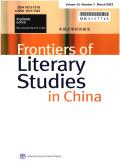大师叙事的形成与打破——“多元抒情古典主义”双特刊简介
IF 0.1
4区 文学
0 ASIAN STUDIES
引用次数: 1
摘要
“多价抒情古典主义”双特刊导论《中国文学研究前沿》及下期特刊致力于探索中国现代古典主义诗歌的不同形式、功能、语言域和思想信念。“古典主义诗歌”和“抒情古典主义”这两个词在2015年12月的FLSC特刊《回归现代性》中有定义。正如我们当时和现在所讨论的,“作者选择古典文学语言而不是现代白话来写诗,并不一定是因为传统的惯性。相反,它反映了一种强烈的需要,即在与传统的连续性中构建一种文化/审美身份。因此,20世纪的古典文学语言诗歌,包括实验性的和半古典的当代诗歌和歌词,可以被视为一种‘古典主义诗歌’,与其他风格和现代诗歌流派相提并论。”下面将对这个术语作进一步解释。我们很高兴地看到,在过去的几年里,研究中国现代文学的学者越来越多地同意将古典主义诗歌纳入他们的讨论。例如,最近出版的《中国现代新文学史》将古典风格诗歌的不同生产和消费纳入其叙事中,并关注女性、合作者、散居诗人和网络诗人的诗歌,尽管主要焦点仍然是白话流派和作家。考虑到本文章由计算机程序翻译,如有差异,请以英文原文为准。
The Making of a Master Narrative and How to Break It—Introduction to the Double Special Issue “Multivalent Lyric Classicism”
The Making of a Master Narrative and How to Break It—Introduction to the Double Special Issue “Multivalent Lyric Classicism” This and the next special issues of Frontiers of Literary Studies in China (FLSC) are dedicated to exploring the diverse forms, functions, linguistic registers, and intellectual persuasions of modern Chinese classicist poetry. The terms “classicist poetry” and “lyric classicism” are defined in the December 2015 special issue of FLSC, “Back into Modernity.” As we have argued then, and are arguing now, “the authors’ choice of classical literary language instead of modern vernacular for their versification was not necessarily due to the inertia of the tradition. It rather reflected a keenly felt need to construct a cultural/aesthetic identity in continuity with the tradition. Therefore, twentieth‐century poetry in the classical literary language, including experimental and semi‐classical contemporary verses and lyrics, may be regarded as a form of ‘classicist poetry,’ on a par with other styles and schools of modern poetry.” Further explanation on this term will follow. We are glad to see that in the past few years, scholars of modern Chinese literature have increasingly agreed to include classicist poetry into their discussion. The recently published A New Literary History of Modern China, for instance, has integrated the diverse production and consumption of classical‐style poetry into its narrative, with attention on such poetry written by women, collaborationists, diaspora and online poets, even though the predominant focus is still on vernacular genres and authors. Considering the
求助全文
通过发布文献求助,成功后即可免费获取论文全文。
去求助
来源期刊

Frontiers of Literary Studies in China
Multiple-
CiteScore
0.10
自引率
0.00%
发文量
360
期刊介绍:
Frontiers of Literature in China seeks to provide a forum for a broad blend of peer-reviewed academic papers of literature in order to promote communication and exchanges between litterateurs in China and abroad. It will reflect the enormous advances made in China in the field of literature in recent years. In addition, this journal also bears the mission of introducing the academic achievements on Chinese literature research to the world. The coverage will include the following main branches of literature, both theoretical and applied: ancient Chinese literature, modern Chinese literature and contemporary Chinese literature.
 求助内容:
求助内容: 应助结果提醒方式:
应助结果提醒方式:


